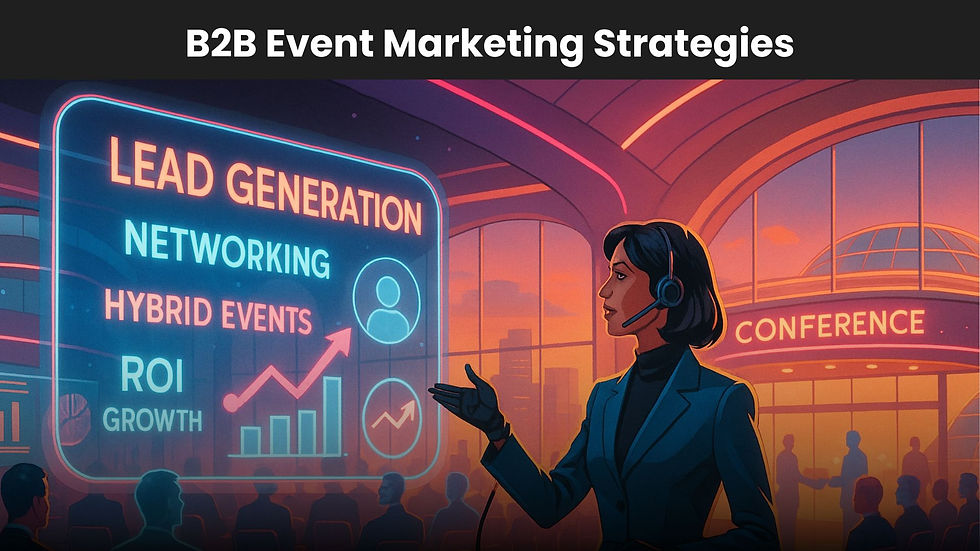Event Marketing Strategies for Successful B2B Events
- Sam Hajighasem

- Oct 21
- 4 min read
Updated: Oct 27
Event marketing is a cornerstone for successful B2B interaction, bringing together businesses, prospects, and thought leaders under one umbrella. Whether it’s a conference, trade show, or virtual summit, the right event marketing strategy can amplify brand visibility, generate high-quality leads, and foster meaningful relationships. With the rising popularity of hybrid and virtual formats, B2B events now have the potential for even wider reach and better ROI. Let’s dive into actionable strategies and proven tactics to ensure the success of your next B2B event.
What Is Event Marketing and Why Is It Critical for B2B Success?
Event marketing encompasses the conceptualization, promotion, execution, and analysis of events to engage target audiences and meet marketing objectives. For B2B companies, events serve as a powerful platform to foster connections, demonstrate expertise, and convert attendees into leads. In fact, 80% of marketers state that B2B events are crucial to their company’s success. Events such as trade shows, conferences, and webinars help businesses stand out in competitive markets.
Benefits of Event Marketing in a B2B Context
1. Lead Generation: Events attract qualified leads more likely to align with your offerings and convert into clients.
2. Brand Credibility: Sharing industry insights and trends positions your company as a thought leader.
3. Personal Engagement: Face-to-face or virtual interactions foster deeper connections and trust.
4. Networking: Events enable networking with industry peers, potential partners, and clients.
5. ROI Amplification: Post-event analysis enhances future event strategies, boosting returns.
Proven Event Marketing Strategies to Optimize Results
1. Set Clear, Measurable Goals
Define what success looks like for your event. Use key performance indicators (KPIs) such as attendee numbers, leads generated, engagement metrics, and revenue impact to measure your results.
2. Advanced Audience Targeting and Personalization
Audience targeting is a game-changer for B2B events. Use advanced segmentation strategies to craft personalized communications that resonate with attendees. For example, segment webinar attendees by job title and industry to ensure tailored content during breakout sessions.
3. Select the Right Event Type
Each B2B event type serves specific goals:
Conferences: Ideal for positioning your company as an expert (e.g., HubSpot’s INBOUND with keynote speakers).
Trade Shows: Showcase your products and connect with a wider audience of potential buyers.
Webinars: Cost-effective for digital product launches or virtual education.
Networking Events: Build partnerships and strengthen industry relationships.
Hybrid Events: Combine on-site and remote attendance for maximum reach.
4. Leverage Technology Effectively
From event management software to wearable technology, advanced tools streamline the planning, execution, and analysis of events. For instance:
Use CRM software like Salesforce to track leads and interactions during events.
Utilize tools like Livestorm for seamless virtual or hybrid event hosting.
Leverage real-time analytics through mobile apps to track attendee engagement.
5. Create a Robust Marketing Campaign
Promote your event using a mix of digital marketing channels. Key tactics include:
Email Marketing Automation: Send personalized email campaigns to nurture prospects.
Social Media Ads: Target ads on platforms like LinkedIn to reach decision-makers.
Content Marketing: Publish blogs, videos, and case studies that highlight the event value.
Retargeting Campaigns: Use cookies to re-engage attendees who showed early interest.
Enhancing ROI from B2B Events
1. Measure Key Metrics
Track and optimize the following event-specific metrics:
Marketing Cost Per Attendee: Helps assess budget efficiency.
New Leads vs. Conversions: Tracks your event’s success in driving actionable outcomes.
Session Engagement: Analyze which sessions saw the most engagement to refine future content.
2. Leveraging Hybrid and Virtual Formats
Hybrid and virtual event models allow for greater scalability and inclusivity. Ensure thorough planning to accommodate remote attendees equally:
Use virtual platforms with robust chat and networking features.
Ensure on-demand sessions for diverse time zones.
3. Post-Event Follow-Up and Lead Nurturing
Post-event strategies are critical to turning attendees into long-term clients. Actions you should take:
Send personalized thank-you emails within 24 hours.
Share key event highlights or session recordings via follow-up emails.
Retarget leads on social media using event-based ad campaigns.
Frequently Asked Questions About Event Marketing for B2B
What Are the Best Tools for B2B Event Planning?
CRM platforms like HubSpot, event management software such as Cvent, and virtual hosting tools like Zoom or Livestorm are essential.
How Can We Measure ROI for B2B Events?
ROI can be calculated by comparing total event-generated revenue with event expenses. Use tools like Google Analytics or attendee tracking software to capture data across digital touchpoints.
What Types of B2B Events Are Most Effective?
The effectiveness depends on your objectives. Conferences boost brand credibility, trade shows generate leads, and webinars engage remote audiences.
Conclusion: Achieving Success with Your Next Event
B2B events are unparalleled in creating touchpoints that matter, from lead generation to brand visibility. By deploying robust event strategies like audience targeting, technology integration, and data analytics, you set yourself up for success. Post-event follow-ups and iterative improvements further boost your ROI. Whether virtual, hybrid, or in-person, the right approach ensures every dollar spent delivers value.
Ready to plan your next successful B2B event? Start by setting clear goals, leveraging technology, and nurturing connections to make the most of every opportunity.






Comments